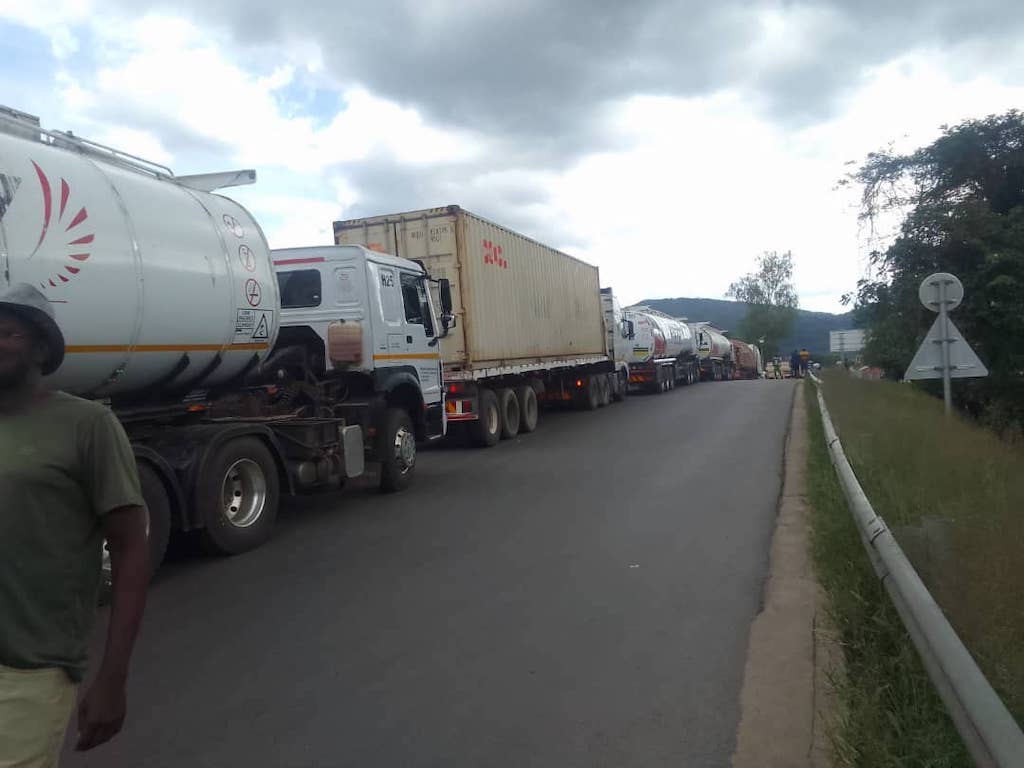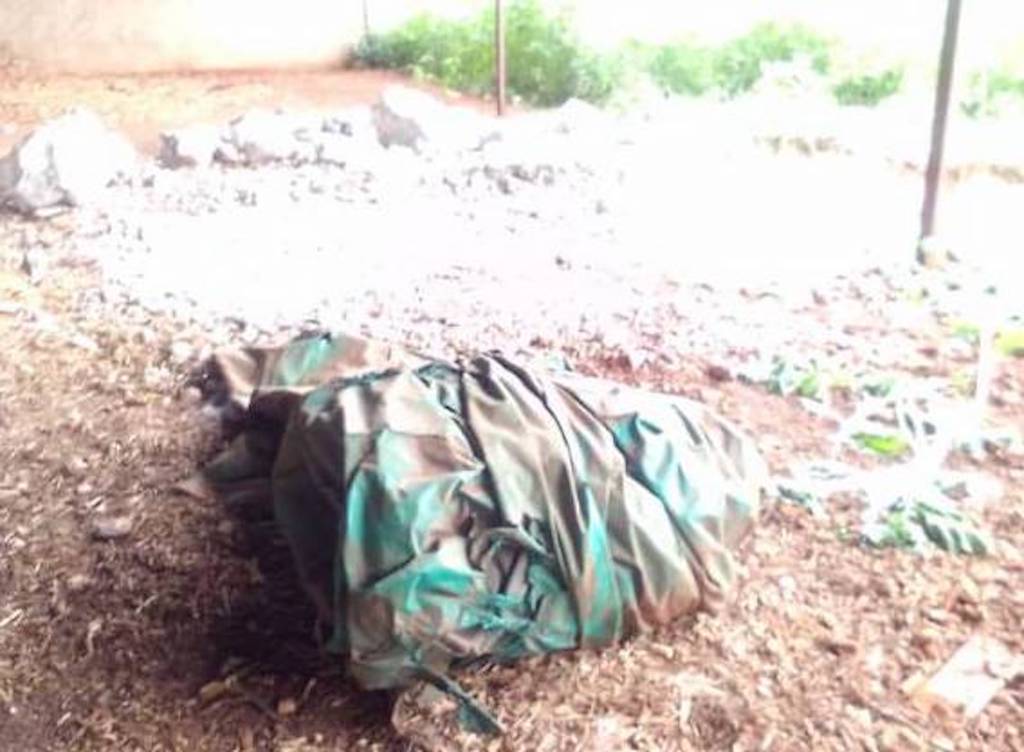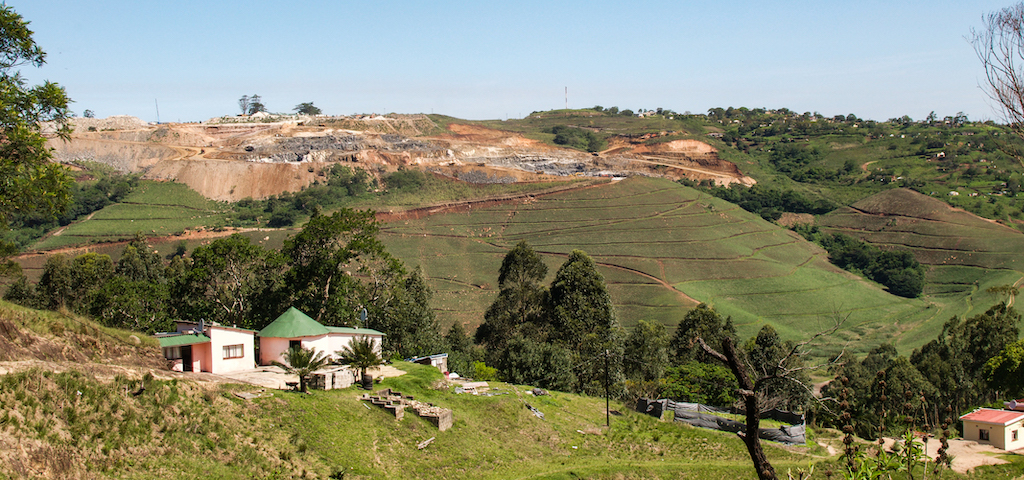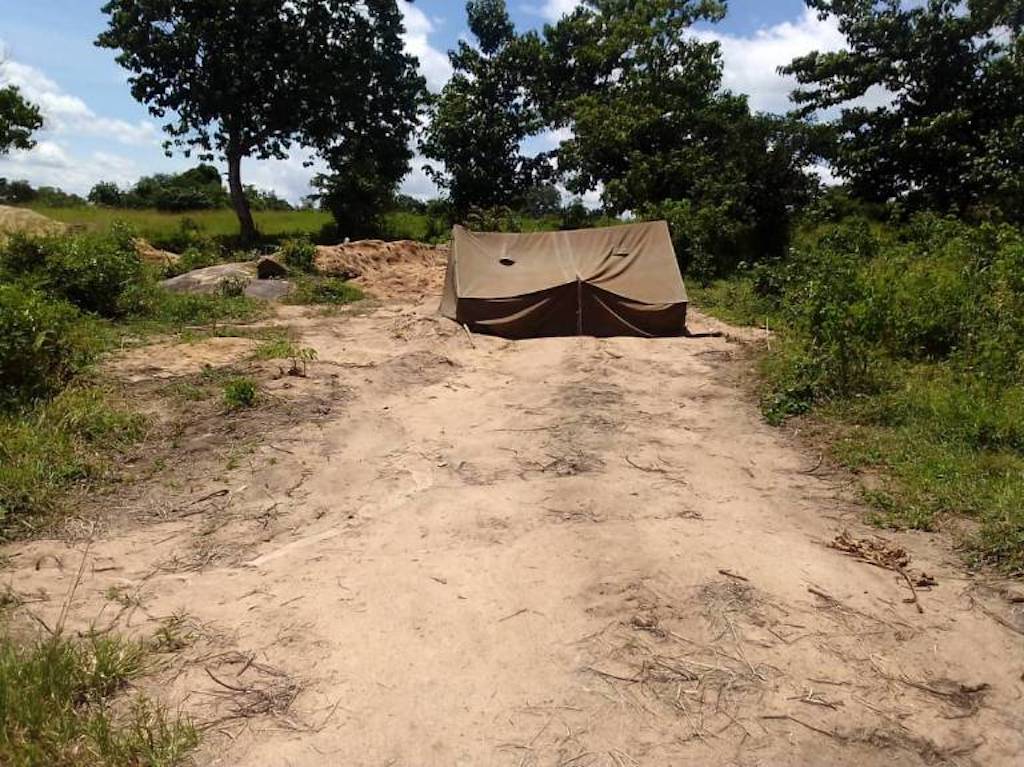
07 Apr On the trail of lithium smugglers in Southern Africa
International intelligence data shows a recent boom in lithium exports from Southern Africa to Chinese markets. Where’s it coming from, and how does it get there? Andiswa Matikinca and Tatenda Chitagu investigate

An undercover image of trucks lining up at the Machipanda border, a major economic link between Zimbabwean capital Harare and Mozambican port city Beira. Photo supplied
A convoy of haulage trucks laden with cargo snakes for about 2km on the road along the Zimbabwe-Mozambique border in the eastern city of Mutare, waiting to cross into the neighbouring country on a hot Saturday morning.
Clearing agents from both countries pace up and down doing immigration processes, which sometimes take hours to complete. To a casual observer, this is a sign that due process is being followed.
Not so, when you dig deep into the underworld of smuggling.
Oxpeckers went looking for lithium, one of the minerals considered critical for both the energy and transport sectors as it is a key component in the production of electric vehicles and in lithium-ion batteries for energy storage.
Zimbabwe has Africa’s largest lithium reserves and is ranked as one of the top 10 countries in the world producing the soft, silvery-white ore (see Zimbabwe’s lithium liability). The country has the leading lithium production growth in Southern Africa, surging from 2% to 10% of global supply since 2022.
The government banned the export of raw, unprocessed lithium in 2022, arguing that the country would get more revenue from the mineral if companies were allowed to export only processed lithium. The ban was also meant to reduce the smuggling of the mineral.

Lithium being crushed and packaged by artisanal miners in Bikita, for export across the border. Photo supplied
Lithium contraband
While most of the lithium is mined by big companies like Sinomine, among others, some of it is in the hands of artisanal and small-scale and artisanal miners (ASMs), both registered and unregistered, who will smuggle it across the border for high prices, according to a source active in the chain. Lithium contraband also includes ore stolen from the big mines and hidden among other exports.
Alerted to 2024 data collated by private business intelligence company CRU Group showing that an untraceable amount of raw lithium is being exported from South Africa into China, Oxpeckers journalist Tatenda Chitagu went undercover, to show how extra lithium from the region’s largest producer is being smuggled to South Africa. He uncovered just how easy it is to facilitate the smuggling of lithium out of Zimbabwe.
“Before the onset of the rainy season and a recent intense anti-smuggling operation, between three and five trucks carrying undocumented lithium would pass through this route monthly without anyone noticing,” said a border official in Mutare who cannot be named for security reasons. “If you are prepared to pay, you can literally smuggle anything at the border via a middleman.”

Machipanda border post: Between three and five trucks carrying undocumented lithium pass through this route monthly ‘without anyone noticing’, said a border official. Photo supplied
Majori-jori
At the Machipanda border post, a major economic link between Zimbabwean capital Harare and Mozambican port city Beira, young men and women offered to help to facilitate the smuggling of goods on a truck. They are commonly referred to as Majori-jori (smuggling facilitators).
They serve as fronts for border employees, soldiers and policemen, who seek bribes in order to ensure goods can pass through the border without duty or being declared. They demanded U$300 to facilitate the passing of a 30 tonne truck laden with lithium.
“It’s easy my friend. When you pay, the guy who scans gets blind. He does not see anything bad about your cargo. It will be cleared in seconds. The police and soldiers get their share. It’s a done deal,” they said.
Three extremely confident young men introduced the Oxpeckers team to a post for soldiers and police, where they assured us all would go smoothly before asking for money for drinks. We promised to bring the truck in the evening and left.
Investigations show when the lithium crosses into Mozambique, the mineral is sold to Chinese buyers offering lucrative prices who ship it to Beijing via the Beira Port.
“There is a ready and lucrative market in Mozambique as compared to Zimbabwe and there are many Chinese buyers there,” one of the smuggling facilitators said.
Beitbridge
About 550km south lies the Zimbabwe-Beitbridge border post to South Africa, SADC’s busiest inland port of entry. The post is modern with the latest security infrastructure, and cargo on haulage trucks is scanned at a weir bridge before crossing.
On the surface, it appeared as if the border has been sealed and nothing could cross without following due process. But the hordes of people who mill around at the border entrance will tell you anything can be smuggled if you have the right “middleman”.
Asked if it was possible to smuggle lithium across the border into South Africa, a clearing agent responded: “It depends on the quantity of your lithium. We do all the deals here at the official entry.
“We need to know the security details [personnel] on duty during the day, and then pay them before they go to work at night. We also need to pay the immigration officials on duty on the day you want your stuff to cross. They also need to know the registration number and colour of the haulage truck ferrying your minerals so that at the scanning process they are not thorough,” the clearing agent said.
“Where is your stuff so that I can assess and come up with the cost,” he asked. “When you are ready, call me and we will meet somewhere safe first.”
Two hours of observing the movement of trucks at the weir and scanning bridge showed that in some instances the security agents carried out cursory “window dressing” on some trucks and literally turned a blind eye to them, while in others they did a thorough job – sometimes ordering the removal of canvas covering the cargo.
“If they are oiled, it’s not a problem, they will turn a blind eye. It’s a chain, from the ones at the scanner and weir bridge, to almost everyone on duty at the Zimbabwean side that day. The Zimbabwean security details will link you with the other guys on the South African side. If you take a gamble and pay the Zimbabwe side only, you may have trouble with the South African security details,” a middleman explained.
South Africa
A battery market analyst at the CRU Group, Cameron Hughes, told Oxpeckers that it had noted a spike in exports of lithium from South Africa in September 2024, during which about 147,000 tons of ore was shipped to China and would have contained about 2% to 2.5% lithium content. “We are still unclear where all of this came from,” he said.
Asked if this spike could be attributed to contraband smuggled from Zimbabwe, Paul Miller, director of mining supply consultancy AmaranthCX, said South Africa is a small player in lithium exports: “We don’t have any lithium concentrate plants in South Africa.”
South Africa has just three known lithium mines, located in the Northern Cape province and KwaZulu-Natal (see Critical futures: What SA wants from its transition minerals).
“They’re small operations, only two of which have produced direct shipping ore in the last few years and they’re not really meaningful producers. I stand to be corrected, but I doubt they would have produced that much lithium in any way, shape, or form,” Miller said.
“The Zimbabweans have built some really big processing plants and have got a much bigger industry, much bigger than South Africa, with about two billion dollars having been invested in Zimbabwe by the Chinese,” he added.

SA Lithium’s Highbury Mine in Umzumbe, KwaZulu-Natal, one of just three known lithium mines in South Africa. Photo: Aphiwe Moyo
Access to information
Attempts to access information on lithium exports from the Department of Trade Industry and Competition were unsuccessful as the department’s media relations unit indicated that the detailed nature of Oxpeckers’ inquiries would be better addressed by the Department of Minerals and Petroleum Resources (DMPR). Statistics South Africa, which publishes monthly mining production indices and mining sales data, also referred Oxpeckers’ request to the DMPR.
In response to a request for data on lithium production and exports in recent years, DMPR spokesperson Makhosonke Buthelezi said it had received production data from just one lithium producer. “South Africa only started producing lithium from only one producer, SA Lithium (Pty) Ltd, from the year 2023,” he said.
Oxpeckers reached out to Mintek – a science council that is an entity of the DMPR – to find out what grade of lithium is found in South Africa and how viable it is for international markets and the energy transition, but was referred to the DMPR and the Department of Trade and Industry.
During a presentation on the “State of the South African mining industry and critical minerals strategy” in a parliamentary meeting in March, Mintek chief executive Molefi Motuku said the country holds significantly low reserves of lithium.
Oxpeckers sent questions to South Africa’s Border Management Authority (BMA) about suspected smuggling of raw lithium resources mined by ASMs in Zimbabwe to South Africa a week before publishing, but has not received a response.

A makeshift military camp manned by soldiers on a dirt road in Burma valley, Zimbabwe. A well-known smuggler created the road to cross into Mozambique while avoiding the border. Photo supplied
Porous borders
The CRU Group report indicates that low-grade ore is streaming out of several African countries despite export bans on unprocessed ore in countries such as Zimbabwe. This ore is reportedly sold to markets by ASMs, which accounted for almost two-thirds of African supply in 2023.
Oxpeckers discovered the smugglers are able to ship this low-grade ore to neighbouring countries without subjecting themselves to border formalities.
In the Burma valley on the Zimbabwean border with Mozambique, for instance, there was a makeshift military camp manned by soldiers on a dirt road, deep in the hills that demarcate the two countries.
“This road was not constructed by the government. A well-known smuggler established this road and put his graders and bulldozers to clear it. It crosses into Mozambique while avoiding the border,” said a smuggler who has been using this road for five years, crossing people and goods illegally.
The local law enforcement agents, including soldiers at the makeshift military base, facilitate the movement of trucks along this road into Mozambique in return for bribes, he said.
Zimbabwe Mines Minister Winston Chitando did not respond to questions about lithium smuggling by ASMs. The spokesperson for the Zimbabwe Revenue Authority, Gladmore Njanji, also did not respond to questions about the smuggling at the time of publication.
This investigation is part of the Oxpeckers #PowerTracker investigative series titled ‘The human cost of energy in Africa’.
- Find the #PowerTracker digital tool and more investigations here
